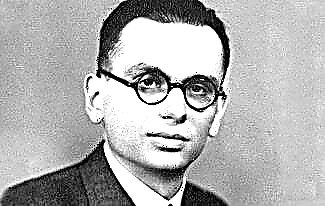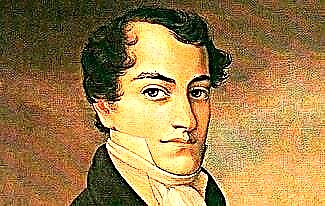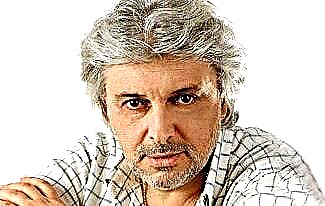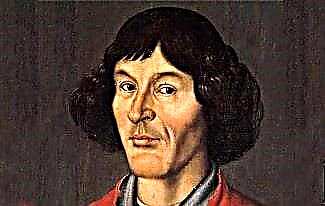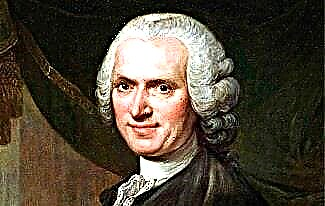Isaac Newton (1643-1727) - English physicist, mathematician, mechanic and astronomer, one of the founders of classical physics. The author of the fundamental work "Mathematical Principles of Natural Philosophy", in which he presented the law of universal gravitation and 3 laws of mechanics.
He developed differential and integral calculus, color theory, laid the foundations of modern physical optics and created many mathematical and physical theories.

There are many interesting facts in Newton's biography, which we will talk about in this article.
So, before you is a short biography of Isaac Newton.
Biography of Newton
Isaac Newton was born on January 4, 1643 in the village of Woolstorp, located in the English county of Lincolnshire. He was born into the family of a wealthy farmer, Isaac Newton Sr., who died before his son was born.
Childhood and youth
Isaac's mother, Anna Eiskow, began a premature birth, as a result of which the boy was born prematurely. The child was so weak that the doctors did not hope that he would survive.
Nevertheless, Newton managed to scramble out and live a long life. After the death of the head of the family, the mother of the future scientist got several hundred acres of land and 500 pounds, which at that time was a considerable amount.
Soon, Anna remarried. Her chosen one was a 63-year-old man, to whom she gave birth to three children.
At that moment in his biography, Isaac was deprived of his mother's attention, since she took care of her younger children.

As a result, Newton was raised by his grandmother, and later by his uncle William Ascoe. During that period, the boy preferred to be alone. He was very taciturn and withdrawn.
In his free time, Isaac enjoyed reading books and designing various toys, including a water clock and a windmill. However, he continued to get sick often.
When Newton was about 10 years old, his stepfather passed away. A couple of years later, he began attending a school near Grantham.
The boy received high marks in all disciplines. In addition, he tried to compose poetry, while continuing to read different literature.
Later, the mother took her 16-year-old son back to the estate, deciding to shift a number of economic responsibilities to him. However, Newton was reluctant to take up physical work, preferring to it all the same reading books and constructing various mechanisms.
Isaac's school teacher, his uncle William Ascoe and an acquaintance of Humphrey Babington, were able to persuade Anna to allow the talented young man to continue his studies.
Thanks to this, the guy was able to successfully graduate from school in 1661 and enter the University of Cambridge.
The beginning of a scientific career
As a student, Isaac was in sizar status, which allowed him to receive free education.
However, in return, the student was obliged to perform various jobs at the university, as well as help wealthy students. And although this state of affairs irritated him, for the sake of studying, he was ready to fulfill any requests.
During that period of his biography, Isaac Newton still preferred to lead an isolated lifestyle, without having close friends.
Students were taught philosophy and natural science according to the works of Aristotle, despite the fact that by that time the discoveries of Galileo and other scientists were already known.
In this regard, Newton was engaged in self-education, carefully studying the works of the same Galileo, Copernicus, Kepler and other famous scientists. He was interested in mathematics, physics, optics, astronomy and music theory.
Isaac worked so hard that he was often malnourished and sleep deprived.

When the young man was 21 years old, he began to conduct research on his own. He soon brought out 45 problems in human life and nature that had no solutions.
Later, Newton met the outstanding mathematician Isaac Barrow, who became his teacher and one of the few friends. As a result, the student became even more interested in mathematics.
Soon, Isaac made his first serious discovery - the binomial expansion for an arbitrary rational exponent, through which he came to a unique method of expanding a function into an infinite series. In the same year he was awarded a bachelor's degree.
In 1665-1667, when the plague was raging in England and a costly war with Holland was waged, the scientist settled for a while in Woustorp.
During this period, Newton studied optics, trying to explain the physical nature of light. As a result, he arrived at a corpuscular model, considering light as a stream of particles emitted from a specific light source.
It was then that Isaac Newton presented, perhaps, his most famous discovery - the Law of Universal Gravity.
An interesting fact is that the story related to the apple that fell on the head of the researcher is a myth. In fact, Newton was gradually approaching his discovery.
The famous philosopher Voltaire was the author of the legend about the apple.
Scientific fame
In the late 1660s, Isaac Newton returned to Cambridge, where he received a master's degree, a separate residence and a group of students, whom he taught various sciences.
At that time, the physicist constructed a reflector telescope, which made him famous and allowed him to become a member of the Royal Society of London.
A huge number of important astronomical discoveries were made with the help of the reflector.
In 1687 Newton completed his main work, "Mathematical Principles of Natural Philosophy." He became the mainstay of rational mechanics and all mathematical natural science.

The book contained the law of universal gravitation, 3 laws of mechanics, the Copernican heliocentric system, and other important information.
This work was replete with precise proofs and formulations. It did not contain any of the abstract expressions and vague interpretations that were found in Newton's predecessors.
In 1699, when the researcher held high administrative positions, the system of the world outlined by him began to be taught at the University of Cambridge.
Newton's inspirations were mostly physicists: Galileo, Descartes, and Kepler. In addition, he highly appreciated the works of Euclid, Fermat, Huygens, Wallis and Barrow.
Personal life
All his life Newton lived as a bachelor. He focused exclusively on science.
Until the end of his life, the physicist almost never wore glasses, although he had a slight myopia. He rarely laughed, almost never lost his temper and was restrained in emotions.
Isaac knew the account of money, but he was not stingy. He showed no interest in sports, music, theater or travel.
All his free time Newton devoted to science. His assistant recalled that the scientist did not even allow himself to rest, believing that every free minute should be spent with benefit.
Isaac even upset that he had to spend so much time sleeping. He set for himself a number of rules and self-restraints, which he always strictly adhered to.
Newton treated relatives and colleagues with warmth, but he never sought to develop friendly relations, preferring loneliness to them.
Death
A couple of years before his death, Newton's health began to deteriorate, as a result of which he moved to Kensington. It was here that he died.
Isaac Newton died on March 20 (31), 1727 at the age of 84. All London came to say goodbye to the great scientist.
Newton Photos









